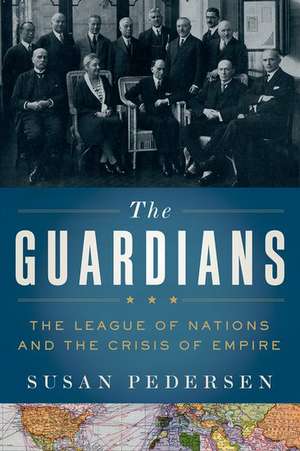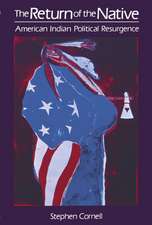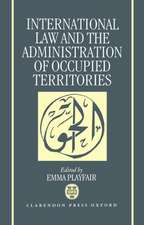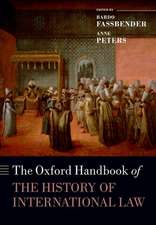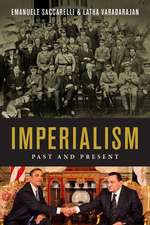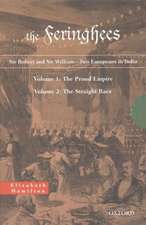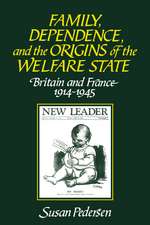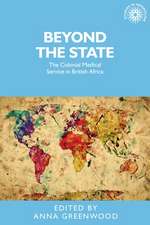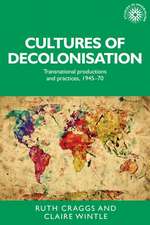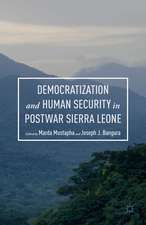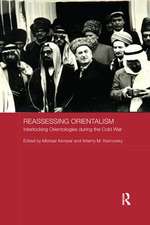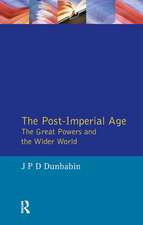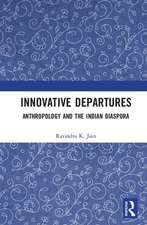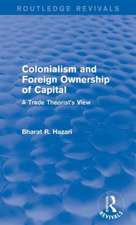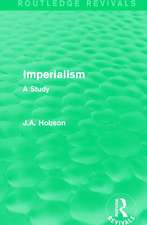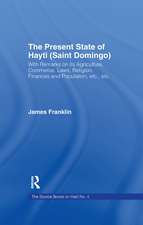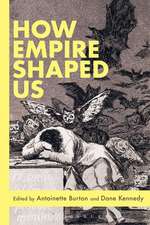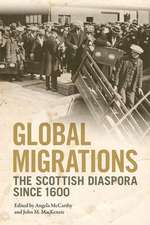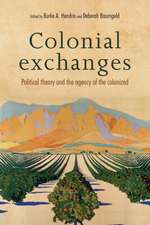The Guardians
Autor Susan Pedersenen Limba Engleză Hardback
Vezi toate premiile Carte premiată
Cundill Prize (2015)
Shortlisted for the Lionel Gelber Prize
At the end of the First World War, the Paris Peace Conference saw a battle over the future of empire. The victorious allied powers wanted to annex the Ottoman territories and German colonies they had occupied; Woodrow Wilson and a groundswell of anti-imperialist activism stood in their way. France, Belgium, Japan and the British dominions reluctantly agreed to an Anglo-American proposal to hold and administer those allied conquests under "mandate" from the new League of Nations. In the end, fourteen mandated territories were set up across the Middle East, Africa and the Pacific. Against all odds, these disparate and far-flung territories became the site and the vehicle of global transformation.
In this masterful history of the mandates system, Susan Pedersen illuminates the role the League of Nations played in creating the modern world. Tracing the system from its creation in 1920 until its demise in 1939, Pedersen examines its workings from the realm of international diplomacy; the viewpoints of the League's experts and officials; and the arena of local struggles within the territories themselves. Featuring a cast of larger-than-life figures, including Lord Lugard, King Faisal, Chaim Weizmann and Ralph Bunche, the narrative sweeps across the globe-from windswept scrublands along the Orange River to famine-blighted hilltops in Rwanda to Damascus under French bombardment-but always returns to Switzerland and the sometimes vicious battles over ideas of civilization, independence, economic relations, and sovereignty in the Geneva headquarters. As Pedersen shows, although the architects and officials of the mandates system always sought to uphold imperial authority, colonial nationalists, German revisionists, African-American intellectuals and others were able to use the platform Geneva offered to challenge their claims. Amid this cacophony, imperial statesmen began exploring new means - client states, economic concessions - of securing Western hegemony. In the end, the mandate system helped to create the world in which we now live.
A riveting work of global history, The Guardians enables us to look back at the League with new eyes, and in doing so, appreciate how complex, multivalent, and consequential this first great experiment in internationalism really was.
| Toate formatele și edițiile | Preț | Express |
|---|---|---|
| Paperback (2) | 100.97 lei 32-37 zile | |
| OUP OXFORD – 13 iul 2017 | 100.97 lei 32-37 zile | |
| Oxford University Press – dec 2017 | 149.46 lei 6-8 săpt. | |
| Hardback (1) | 325.54 lei 6-8 săpt. | |
| Oxford University Press – | 325.54 lei 6-8 săpt. |
Preț: 325.54 lei
Nou
Puncte Express: 488
Preț estimativ în valută:
62.29€ • 65.39$ • 51.70£
62.29€ • 65.39$ • 51.70£
Carte tipărită la comandă
Livrare economică 10-24 aprilie
Preluare comenzi: 021 569.72.76
Specificații
ISBN-13: 9780199730032
ISBN-10: 0199730032
Pagini: 592
Dimensiuni: 160 x 236 x 51 mm
Greutate: 0.89 kg
Editura: Oxford University Press
ISBN-10: 0199730032
Pagini: 592
Dimensiuni: 160 x 236 x 51 mm
Greutate: 0.89 kg
Editura: Oxford University Press
Notă biografică
Susan Pedersen is Professor and James P. Shenton Professor of the Core Curriculum at Columbia University. She specializes in British history, the British Empire, comparative European history, and international history. She is the author of several books, including Eleanor Rathbone and the Politics of Conscience.
Descriere
Descriere de la o altă ediție sau format:
The First World War threw the imperial order into crisis. New states emerged from the great European land empires, while Germany's African and Pacific colonies, and the Ottoman provinces in the Middle East fell into allied hands. Britain, France, Belgium, Japan, and the British dominions wanted to keep the new states, but Woodrow Wilson and the millions converted to the ideal of self-determination thought otherwise. At the Paris Peace conference of 1919, the allies agreed reluctantly to govern their new conquests according to international and humanitarian norms and under 'mandate' from the League of Nations. As The Guardians shows, this decision had enormous consequences. The allies sought to use the League to safeguard imperial authority, but that authority was undermined by the mechanisms for international oversight they had themselves created. Colonial nationalists and humanitarians exploited new rights of petition or opportunities for publicity to expose abuses or scandals; Germans resentful of the loss of their colonies and Italians eager to found a new empire arrived in Geneva to demand a repartition of the spoils. As imperial politicians wearied of continual scandals and crises - revolts in South West Africa, Syria, Samoa, and Palestine; famine in Rwanda; labour abuses in New Guinea; extortionate oil contracts in Iraq - they began to question whether independent states might be easier to deal with than territories subject to international scrutiny. Drawing on research in four continents and dozens of archives, and bringing to life a global network of nationalists, humanitarians, international bureaucrats, and imperial statesmen, The Guardians offers an entirely new interpretation of the importance of international organizations in the emergence of the modern world order.
The First World War threw the imperial order into crisis. New states emerged from the great European land empires, while Germany's African and Pacific colonies, and the Ottoman provinces in the Middle East fell into allied hands. Britain, France, Belgium, Japan, and the British dominions wanted to keep the new states, but Woodrow Wilson and the millions converted to the ideal of self-determination thought otherwise. At the Paris Peace conference of 1919, the allies agreed reluctantly to govern their new conquests according to international and humanitarian norms and under 'mandate' from the League of Nations. As The Guardians shows, this decision had enormous consequences. The allies sought to use the League to safeguard imperial authority, but that authority was undermined by the mechanisms for international oversight they had themselves created. Colonial nationalists and humanitarians exploited new rights of petition or opportunities for publicity to expose abuses or scandals; Germans resentful of the loss of their colonies and Italians eager to found a new empire arrived in Geneva to demand a repartition of the spoils. As imperial politicians wearied of continual scandals and crises - revolts in South West Africa, Syria, Samoa, and Palestine; famine in Rwanda; labour abuses in New Guinea; extortionate oil contracts in Iraq - they began to question whether independent states might be easier to deal with than territories subject to international scrutiny. Drawing on research in four continents and dozens of archives, and bringing to life a global network of nationalists, humanitarians, international bureaucrats, and imperial statesmen, The Guardians offers an entirely new interpretation of the importance of international organizations in the emergence of the modern world order.
Recenzii
[An] original, stimulating and thoroughly researched examination of how the new League managed to sustain a façade of trusteeship in a world of selfish imperial interests... This is a fascinating examination of empire in its final death throes.
A richly detailed study of the League's Permanent Mandates Commission... Pedersen's book is genuinely revelatory a long disquisition on the politics of unintended consequences, as a bureaucratic system designed to uphold and legitimise imperial reconstruction provided the tools for its undoing.
The first indispensable book written on a critical subject in 50 years... fair-minded, hard-hitting and readable... The Guardians is a magnificent book.
A strikingly original book.
The Guardians offers many important insights, not least in demonstrating how internationalism deepened when Germany became a commission member and how the UK's governance of Iraq inspired today's system of economic imperialism. The book's primary revelation, however, relates to what the league did not do. Pedersen argues that self-determination, the concept that supposedly underpinned its creation, "was not what the Commission would serve". Its failure to take seriously the demands of its mandated populations initiated a set of forces that would help to forge our unequal world of today. Pedersen's study is nothing less than a groundbreaking account of how one organisation shaped the 20th century.
A magnificent study.
provides an enlightening, insightful, richly textured exposé of the Mandates Commission from birth to transformation under the United Nations. Her multi-archival, international, superbly footnoted, and, at its core, personality driven narrative brings alive an institution ... the author's highly engaging narrative style makes the book fly by as if it were a summer beach read. Extremely readable, richly informative, and boldly argued.
A richly detailed study of the League's Permanent Mandates Commission... Pedersen's book is genuinely revelatory a long disquisition on the politics of unintended consequences, as a bureaucratic system designed to uphold and legitimise imperial reconstruction provided the tools for its undoing.
The first indispensable book written on a critical subject in 50 years... fair-minded, hard-hitting and readable... The Guardians is a magnificent book.
A strikingly original book.
The Guardians offers many important insights, not least in demonstrating how internationalism deepened when Germany became a commission member and how the UK's governance of Iraq inspired today's system of economic imperialism. The book's primary revelation, however, relates to what the league did not do. Pedersen argues that self-determination, the concept that supposedly underpinned its creation, "was not what the Commission would serve". Its failure to take seriously the demands of its mandated populations initiated a set of forces that would help to forge our unequal world of today. Pedersen's study is nothing less than a groundbreaking account of how one organisation shaped the 20th century.
A magnificent study.
provides an enlightening, insightful, richly textured exposé of the Mandates Commission from birth to transformation under the United Nations. Her multi-archival, international, superbly footnoted, and, at its core, personality driven narrative brings alive an institution ... the author's highly engaging narrative style makes the book fly by as if it were a summer beach read. Extremely readable, richly informative, and boldly argued.
Premii
- Cundill Prize Winner, 2015
